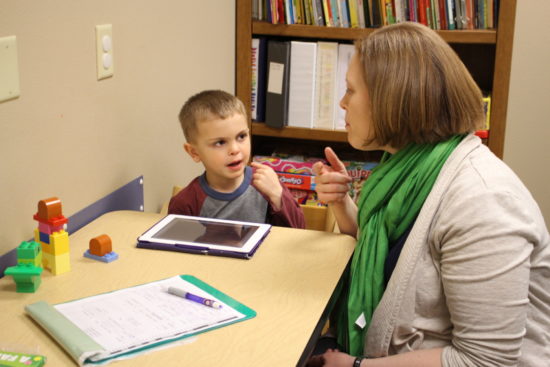Silas: Eager to speak


Emily and her husband Eric credit LifeScape speech-language pathologist Beth Wienhold with much of this dramatic change. Diagnosed with an autism spectrum disorder, Silas had been using sign language, visual schedules, and the picture-based PECS (Picture Exchange Communication System) without much enthusiasm. He really took off, though, when Beth introduced an iPad.
“The iPad had a Tobii Dynavox Compass app, created for kids with ASD,” says Beth. “It has functions for conversational speech, comments, schedules—it’s very comprehensive, and it really captured his imagination. We started with core words, and he increased his vocabulary and exceeded his goals very quickly. He actually maxed it out in ten months.”
Along the way, Silas began using words. “He now speaks in five to six word sentences, but it’s hard for people outside the family to understand him,” says Emily. “If we can’t understand him, he’ll show us, and he didn’t even used to do that.”
“We’re working on articulation, now,” says Beth. “Putting his lips together for B, P, and M sounds. Plus, not dropping syllables from words, and putting words into phrases.” Beth says parents are often reluctant to have a child use a speech device, feeling that will hold them back from verbal speech. “The opposite is actually true,” says Beth. “There’s a lot of research that backs that, and we see it a lot.” Once kids learn they can communicate with the device, they start imitating the words. Beth stays busy setting goal after goal for Silas, which he quickly conquers. “He had a broad vocabulary within that program, but verbal speech is always more efficient,” says Beth. “His receptive language (comprehension) is really good, and his parents are really good about working with him at home, which is really important.” Emily says attendance at Head Start and Special Education Preschool helps, too, because he can mimic other kids.
Silas also gets occupational therapy at LifeScape with OT Sabrina Phillips. “It’s very sensory based,” says Emily. “He used to have a lot of eating problems, but he’s come a long way with that, too. He’s willing to try lots of things, now. Meals are a lot less stressful, and he doesn’t gag on his food. He’s moved on to more fine motor skills now.”
“We love how patient they are with him,” Emily says of the LifeScape therapists. “He has problems with changing routine, and they really know how to handle that. They also make sure to ask us what our goals are as a family and for Silas at school. They focus on what will make his life better.” Emily says they’d love for Silas to be able to communicate verbally with people, and to develop friendships. With LifeScape’s help, that now seems possible.

